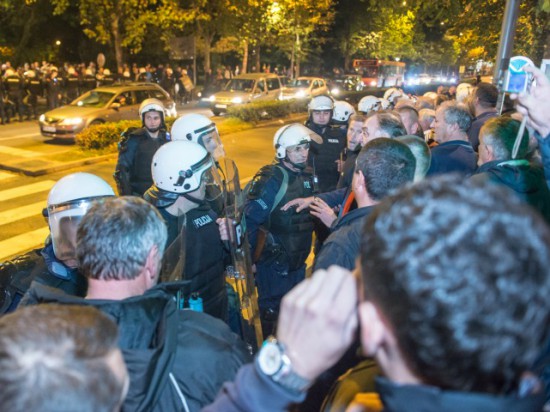Montenegro Protesters Fired Up by Poverty
People have been demonstrating for almost a month in Podgorica, but despite the opposition’s slogans about democracy, many say they’re angrier about unemployment and low wages.
Montenegrins who have been protesting for weeks for the resignation of veteran Prime Minister Milo Djukanovic’s government took to the streets led by an opposition which is calling for fair elections and a tougher fight against corruption and organised crime. But for most of the protesters, the demonstrations in the capital Podgorica were inspired by poverty and their everyday struggle for survival.
“I don’t care about the parties, politicians, and integration [with the EU]. All I want is to have a job from which I can live and take care of my family,” said Marko Vlahovic, a 32-year-old protester from Podgorica.
The round-the-clock demonstrations began in September, as the opposition demanded the creation of an interim government to organise what they say would be Montenegro’s first ever free and fair elections. The rallies were marred by violence for the first time on October 17, with police firing tear gas to disperse protesters. Police fired teargas for a second successive weekend on Saturday to break up around 7,000 people who marched on parliament to demand Djukanovic’s resignation.
The opposition says the tiny Adriatic country is being run as the fiefdom of Djukanovic, who has been in power since 1990, and the political elite surrounding him. “He has been in power more than 25 years, that was enough. Now it’s time for him to go,” said Zoran Vujovic, a 48-year-old protester from the town of Herceg Novi. Montenegro has an unemployment rate of 15 per cent. But the jobless rate in the north of the country is higher, according to estimates. A third of the jobless are university graduates under 30 years of age.
The average monthly salary in the country is around 490 euro, but, according to recent data from the Tax Administration, one in every eight people lives on less than 200 euro a month. Another protester, Vladimir, from the town of Berane, said he joined the protests not because he supports everything the opposition says, but because he believes “it is time for citizens to take things in their own hands”. “I am 24 now. I was not even born when Djukanovic took office. Do I have to wait another 25 years for someone new to come and do something?” he asked.
Djukanovic has rejected demands to resign, but has offered to call early elections after December’s NATO meeting when Montenegro is expected to be invited to join the alliance. He has accused the opposition of trying to prevent the country joining NATO, saying he is convinced Russia is behind the protests. The opposition movement combines pro-Western parties and pro-Serb elements who cherish close ties with Serbia and Russia. During the weeks of protest, some of the demonstrators carried banners reading “No to NATO” and “For the military neutrality of Montenegro.”
But Marica Krkes, a 57-year-old hairdresser from the town of Niksic, said the issue was irrelevant compared to ordinary people’s living standards. “We don’t care about NATO, most of us are hungry,” she said. A student called Jovana said meanwhile that the protests were “not about NATO, Serbia or Russia, but about poverty, nepotism and corruption”. “Djukanovic and his friends in the government and in business are millionaires. The rest of us have no hope,” Jovana said. Djukanovic won re-election as premier in 2012, marking the third time he has held the post since Montenegro gained independence from neighboring Serbia in 2006. He has been at the centre of power since 1990, and was president of Montenegro between 1998 and 2002.
The next parliamentary polls in the country with a population of some 630,000 are due early next year.
26 October 2015

